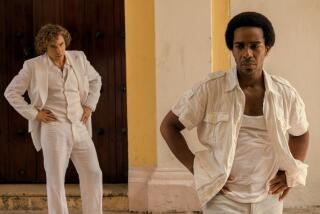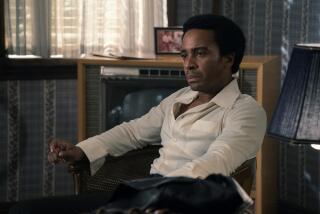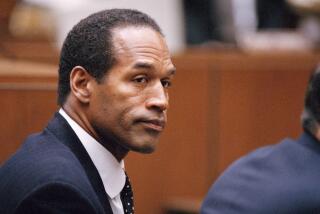Black Panther Founder Huey Newton Is Killed
OAKLAND — Huey P. Newton, a co-founder of the radical Black Panther Party who was revered as a hero and reviled as a criminal, was shot three times in the head and killed Tuesday in a violent, drug-plagued area of West Oakland.
Police declined to speculate on a motive for the predawn shooting, although Newton, 47, had been sentenced earlier this year to 90 days in San Quentin Prison for possessing drug paraphernalia, which was a violation of his parole in an earlier case.
The squalid circumstances of his death belied the powerful role that Newton played during his life. Many of the demands the Panthers made in the ‘60s--school lunches for the poor, civil rights for criminal suspects and greater political representation by blacks--seemed radical to some at the time but have since become commonplace.
At the same time, the Panthers--with their unflinching belligerence toward authority, inflammatory rhetoric and fondness for posturing with loaded weapons on city streets--were involved in a series of often-bloody confrontations with police from Oakland to Chicago to New Haven, Conn.
In the end, friends speculated Tuesday, the burden of living up to his own legend--the man who embodied Black Power to many--may have been too much for Newton and probably led him to what seems to have been a fatal final encounter with Oakland’s deadly cocaine cowboys.
After the shooting, clusters of people on foot and others in cars passed the crime scene throughout the day, some paying private tribute, some intent on inspecting the bloodstains on the sidewalk.
One elderly man who declined to give his name spent several minutes using a white plastic-foam coffee cup to scoop up blood that had pooled in a gutter. When he had filled a plastic juice container, he left.
“Huey was very special, very special,” he said while walking off to catch a bus back to his East Oakland home. “You don’t find many black men like Huey.”
“That blood is highly symbolic,” said Ojo Pede, 38, a Nigerian exchange student who had watched the old man. Pede, who said he had come down from Berkeley for a personal vigil, did not elaborate.
By late afternoon, a banner-draped shrine materialized at the scene. The African People’s Socialist Party played videotapes of Newton’s speeches while mourners deposited red roses, pink and white carnations and black-eyed Susans they had clipped in their gardens or bought at a store.
‘Huey, Thanks. . . .’
A note attached to one bouquet said: “Huey, thanks for all you tried to do. We won’t let the children forget.”
People kept the vigil going into the night, continuing to arrive and stop at the scene.
Oakland Police Lt. Mike Sims said “to our knowledge” neither crack nor any other drug was involved in the case. He also said that there was no evidence supporting robbery as a motive and added that there was no indication that Newton was armed at the time he was killed.
Although Sims said, without elaboration, that more than one suspect may be involved, he would not confirm hospital reports of three gunshot wounds in the head and would not identify the caliber or make of the weapon used.
Sims stated simply that police received reports of shots fired at 5:29 a.m. and officers arrived at the site one minute later. The officers found Newton on his back in a pool of blood, alive but unconscious and mortally wounded.
Phyliss Brown at Highland Hospital in Oakland said Newton arrived there at 5:50 a.m., critically injured with multiple gunshot wounds to the head. She said he was pronounced dead at 6:12 a.m.
Newton was the 98th homicide in Oakland in 1989.
Although he and his wife, Fredrika, a nurse, lived in a gentrified section of Berkeley, Newton frequently visited the run-down West Oakland area, residents there said. Some, who would not give their names, said they observed Newton buying and using crack cocaine in the area.
Newton’s sister-in-law, Babarette Newton, said she did not know about any drug use by the slain activist. She said he had lived with her and her husband, Melvin, Newton’s brother, but that Newton had recently moved back in with his wife.
“As far as I know, he was working on his book and had some sort of a movie deal in the works,” said Newton’s lawyer, Barry L. Morris of Oakland.
Jules Ayo, 54, who said he lived a few doors up from the blood-stained sidewalk where police found Newton, said he heard gunshots at 5:15 a.m. but did not go outside to see what had happened. He said gunplay is common among the run-down, wood-frame, single-family houses in that chronically drug-plagued area.
“When you hear shots, you stay in the house,” he said. “Night people run these streets. We don’t come out at night.”
Among the visitors to the scene, several said Newton embodied Black Power and personalized the anger many felt toward racist institutions. Whatever his shortcomings as a man, they said, paled in comparison to the ideal of racial equality that he forcefully asserted.
“To us, Huey Newton was a hero,” neighborhood resident Fred DePalm told the Associated Press. “The Black Panthers were a thing to identify with along with Malcolm X and Martin Luther King.”
It was, all told, a heartfelt street corner eulogy for the slightly built son of a Louisiana preacher whose prosecution for shooting a policeman spawned a slogan--”Free Huey!”--that became a shorthand taunt for a generation of would-be revolutionaries.
What the milling crowds did not discuss were the complexities of a man some dismissed as a criminal thug and others revered as a hero, someone who spent a large part of his life in jail but had the intelligence and discipline to earn a Ph.D. in social science from UC Santa Cruz.
His doctoral dissertation was entitled, “War Against the Panthers: A Study of Repression in America.”
Newton founded the Black Panther Party for Self Defense in Oakland in 1966 with Bobby Seale, and the two young firebrands with their armed and uniformed Panthers became an alarming and menacing counterpoint to the nonviolent civil rights movement led by the Rev. Martin Luther King Jr.
Panthers roamed the streets of Oakland, a lawbook in one hand and a gun in the other, interrupting arrests and other police activities when they believed that black people were being treated unfairly.
The Panthers burst into the consciousness of most Americans on May 2, 1967, with a provocative stunt during which half a dozen armed Panthers dramatically shoved their way onto the floor of the Assembly in the Capitol in Sacramento.
After state police peacefully disarmed and ejected the six men--as well as 20 supporters who had waited nearby--Seale read a statement complaining about the treatment of blacks and opposing a bill then before the Legislature to ban possession of loaded firearms within city limits.
Six months later, Newton was wounded during a bloody gunfight with Oakland police that left one officer, John Frey, dead and another wounded. The gun battle erupted during a routine traffic stop--a few blocks from where Newton was gunned down Tuesday.
He was convicted in 1968 of voluntary manslaughter in the policeman’s death and was sentenced to spend from two to 15 years in state prison. He was released from prison after 22 months when a state appeal court decided that the trial judge had improperly instructed the jury. A second trial ended in a hung jury.
However, Newton’s trouble with the law had only begun. In 1974, after being charged with killing a 17-year-old prostitute, Kathleen Smith, and later with pistol-whipping a tailor, Newton fled to Cuba and claimed political asylum.
While Newton was in Cuba, the Black Panthers concentrated on programs to feed the hungry, teach the young and battle drug abuse and the pushers who encouraged it.
He returned in 1977 to face the charges; after two new trials ended in hung juries, all charges were dropped.
One year later, he was found guilty of being an ex-felon in possession of a handgun, based on a 1964 conviction of felony assault with a knife. He was found guilty of a second count of the same charge in 1979 and finally was sentenced in 1981 after lengthy appeals.
Additional weapons charges were filed in 1985 when police found a pair of guns in Newton’s home. A jury acquitted Newton of the gun charge a year later.
The handguns, however, were discovered during a separate police search for the financial records of the Panther-run Oakland Community School. Newton was eventually charged with embezzling $600,000 in state aid to the school. Those charges were dropped in exchange for his plea of no contest to a single count of cashing a $15,000 state check for his own use. He was sentenced last March to six months in jail and 18 months probation in the case.
Times researcher Norma Kaufman in San Francisco contributed to this story.
LIVING A LEGEND--Huey Newton the man struggled to live up to Huey Newton the legend. Page 3
More to Read
Sign up for Essential California
The most important California stories and recommendations in your inbox every morning.
You may occasionally receive promotional content from the Los Angeles Times.










